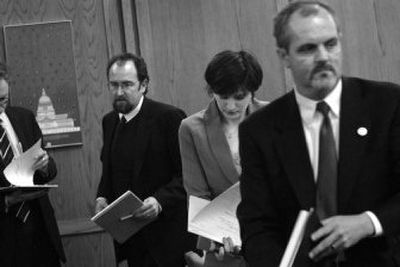Prosecutors want to recheck tests

South Hill rapist Kevin Coe was ordered Thursday to provide prosecutors a new DNA sample so they can double-check previous tests that may erase any doubt about the rape for which he spent 25 years in prison.
Superior Court Judge Kathleen O’Connor granted the request despite objections by defense attorney Tim Trageser, who continued to deny that his client ever raped anyone.
“I’m still, frankly, unclear as to why the state wants a second sample,” Trageser said. “But they made the motion and the court granted it, so there you go.”
O’Connor made the ruling Thursday during a courtroom session with Coe attending by phone. He listened, but never spoke.
Dr. Amy Phenix, a forensic and clinical psychologist, previously testified that she believes Coe was responsible for 53 sexual attacks. Spokane police linked Coe to 43 rapes between 1978 and 1981, and he was convicted of four rapes.
However, because Spokane police detectives used hypnosis to interview witnesses and victims, appellate judges threw out all but one of the convictions. Just days before Coe’s scheduled release on Sept. 8, the state announced its effort to civilly commit him as a sexually violent predator.
Trageser said he will ask O’Connor next week to postpone that civil trial from July 16 to next March. In that case, prosecutors must convince a jury that Coe suffers from mental abnormalities or personality disorders that make him more likely than not to commit future sexual assaults.
If convicted, Coe must remain at a facility on Western Washington’s McNeil Island until his underlying condition changes enough to allow his safe release.
If the jury finds for Coe, who turned 60 this month, the state must immediately release him.
Last month, O’Connor ordered that Coe must submit to a clinical interview with Phenix, a lie detector test about his past sexual history and a penile plethysmograph.
In that plethysmographic test, Phenix will show Coe explicit videos depicting violent rape, pornography and consensual sex to measure his arousal levels.
Assistant Attorney General Todd Bowers also asked O’Connor to ensure that Coe had no advance warning of the test, which could skew the results.
Bowers said Thursday that both sides have agreed to allow the defense’s expert to attend the test. But neither Coe nor his attorneys will have advance warning, Bowers said.
As for the new DNA test, Trageser said he wasn’t surprised by O’Connor’s ruling. But he again questioned recently discovered vaginal slides that, according to court documents, provide the first biological evidence in the 1981 rape that sent Coe to prison.
“We certainly deny that Mr. Coe was involved in any rape and we deny that any DNA found on the slide was from any type of sexual assault,” Trageser said. “If it is his DNA, it’s our position that it was transferred there inadvertently or perhaps even intentionally.”
Trageser pointed out that former Spokane County Prosecutor Don Brockett testified decades ago in court that all the biological evidence from Coe’s cases inadvertently was destroyed.
“And then a few weeks prior to Mr. Coe’s release, some alleged slides and kits are mysteriously found containing Mr. Coe’s DNA,” Trageser said. “It is mysterious.”
Bowers said he’s aware that Brockett believed all the evidence was destroyed.
“This evidence is important because it shows – that despite all of his denials over the years – that (Coe) in fact is the one without any doubt that committed the offense against” the victim, he said.
Trageser said the slides were found in a property room that wasn’t being used in 1981 and the state can’t account for their whereabouts over the past quarter century.
“There are just lengthy gaps of years between the recording of this evidence and then its recent discovery,” he said. “So the state has an uphill burden to admit any of this DNA evidence.”
Aside from the DNA evidence, the biggest legal fight left unresolved is whether prosecutors will be allowed to use police reports from as many as 23 rapes in which the victims identified Coe as their attacker. Most of those cases either weren’t charged or did not result in convictions.
“It’s a huge issue in this case,” Bowers said. “That’s a lot of evidence. It’s going to drive so many things in this case. We really need to get going on that.”